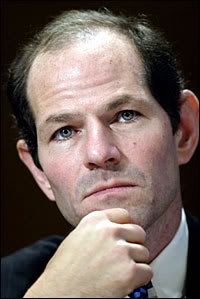 Understandably much of our nation’s focus regarding politics is on Washington as Democrats take control and the Bush Administration continues to prosecute their failed war in Iraq. Will Democrats take a stand or remain subservient? How will Democrats utilize their power for oversight and investigation? And numerous personalities inside the beltway from both parties are already jostling for position in the 2008 presidential election.
Understandably much of our nation’s focus regarding politics is on Washington as Democrats take control and the Bush Administration continues to prosecute their failed war in Iraq. Will Democrats take a stand or remain subservient? How will Democrats utilize their power for oversight and investigation? And numerous personalities inside the beltway from both parties are already jostling for position in the 2008 presidential election.Just as important however are the newly elected Democratic governors and state legislators across the nation. In recent years state capitals have outflanked Washington regarding important issues such as global warming, minimum wage and health care. The New York Times reports today that state capitals are also outflanking Washington regarding changes to ethics and lobbying reform.
As a New Yorker I’m especially enthusiastic about incoming governor Eliot Spitzer (click here to read the text of Spitzer's inaugural address). In terms of corruption and pay to play politics, Albany has made Washington D.C. look like a beacon of rectitude in comparison. Another negative of Albany's culture has been governance by “three men in a room” as outgoing Governor George Pataki, Democratic Assembly Speaker Sheldon Silver and the Senate’s Republican Majority Leader Joseph Bruno made all the important policy decisions. Joining them in their room for a decade was a cabal of special interests and lobbyists while the public was ripped off.
Presently, both parties are back on their heels in Albany regarding ethics as Democratic State Comptroller Alan Hevesi resigned after pleading to a felony and the Republican’s Joseph Bruno recently revealed federal authorities were investigating his outside consulting work. Spitzer to his credit pushed political ally Alan Hevesi out the door after election-day and appears ready to spend his political capital on an ambitious reform agenda.
Today Spitzer signed five executive orders pertaining to procurement and the agencies his office has unilateral control over. He’s also imposing on his staff strict guidelines regarding bans on gifts and prohibiting any part of the executive branch from lobbying his office two years after they leave their posts.
The real challenge of course will be how much and how fast he can push Albany’s lethargic state legislature to accept in reforming state government as a whole. At the moment Spitzer dwarfs representatives from both parties but his popularity will inevitably decline as he makes tough calls regarding Albany's budget deficit.
In spite of the political challenges confronting Spitzer, one can feel a new breeze blowing from the state capital. Blair Horner, the legislative director of the New York Public Interest Research Group told the New York Times,
“He has talked about redistricting reform, he’s talked about campaign finance reform, he’s talked about ending pay to play and he’s talked overall about a transparent and accountable state government. If he accomplishes all of that, that’s probably more reform that we’ve seen in New York for the last 200 years.”The previous Democratic governor Mario Cuomo talked a good game and his rhetorical gifts made him the darling of the national Democratic Party for years. Truthfully, Cuomo didn’t accomplish much as governor and the record suggests his greatest impact was constructing prisons that served the jail industrial complex. George Pataki defeated Mario Cuomo in 1994 partly by claiming to be a reformer and proceeded to govern as a lethargic corporatist. Let’s hope Spitzer turns out to be the real deal.
2 comments:
"Truthfully, Cuomo didn’t accomplish much as governor..."
Not true. He did manage to tax items and services that were never taxed before. He taxed motor oil at 10 cents per quart. He taxed car insurance ("New York State Motor Vehicle Law Enforcement Fee") at 50 cents per year (that cost 45 cents to collect).
It's one of the reasons why I moved the hell out of the state I grew up in.
I'm cautiously optimistic about Spitzer. He's talked a big game, so the expectations are high. He's also had the governorship locked up for a couple years.
Post a Comment